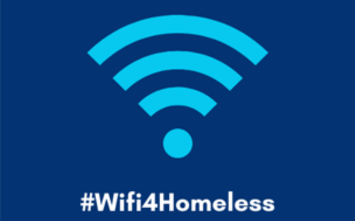Support #wifi4homeless | Sign On Memo in Support of A.5649-A/S.4561-A

Click here to download a copy of the memo with signatories.*
*This memo will be updated and reissued periodically as new organizations sign on.
REPORT ON LEGISLATION TO ENSURE INTERNET ACCESS TO ALL INDIVIDUALS RESIDING IN TEMPORARY HOUSING
A.5649-A (M. of A. Reyes)
S.4561-A (Sen. Gonzalez)
AN ACT to amend the social services law, in relation to providing internet access to all individuals residing in temporary housing; and to amend the New York state urban development corporation act, in relation to the ConnectAll digital equity grant program
SUPPORT
We write on behalf of the undersigned – which includes legal and nonprofit organizations, community groups, and activists – to urge the Legislature and Governor to take steps to ensure internet access to all individuals residing in temporary housing throughout New York State by working to pass and fund A.5649-A/S.4561-A. New Yorkers experiencing homelessness and residing in temporary housing facilities are some of our state’s most vulnerable residents, and it is critical that New York State ensure homeless shelter residents are provided access to the internet.
There has been increasing attention paid to the need for high-quality, reliable internet access, and steps are being taken across the state to close the digital divide, particularly since the COVID-19 pandemic. In a major victory, the Legal Aid Society, along with Milbank LLP and Coalition for the Homeless, Inc., secured a settlement with New York City in April 2021 that ensured that over 200 shelters housing school-age children were equipped with internet access.[1] This is a huge achievement, however the exclusion of single adult shelters means that many are still without access and it does not eliminate the need for all shelter residents across the State to have internet access.
When shelter residents do not have reliable internet access, people are unable to do the things they are told will help uplift them out of homelessness. Seeking jobs and educational opportunities, applying for housing, and reconnecting with family and community are all nearly impossible without being able to get online. Many critical services have become reliant on internet-based platforms as we have moved to a hybrid world post-COVID. Tragically, lack of internet access can have a negative impact on a shelter resident’s physical and mental health, as they struggle to get to telehealth appointments, and devices reliant on internet access – such as an Implant Loop Recorder – cannot send critical real-time data to their doctors. It can also lead to unnecessary interactions with the criminal justice system and court systems as legal services and court appearances are increasingly being offered remotely and often preferred by service providers. Poor or no internet connectivity leaves many shelter residents unable to effectively participate in critical services needed for their well-being. When reliable internet access is not available in shelter, people need to use their extremely limited financial resources to buy monthly cellular data plans or utilize free public WiFi, (e.g., in public spaces, libraries, or coffee shops). This modest access is insufficient and impractical. Self-paid cellular plans often include limits on minutes or data and may not work in shelters with bad cell service. Public WiFi does not provide the data protection or privacy needed to conduct sensitive personal business.
Providing the internet to shelter residents is not just an issue of technology access, it is also an issue of racial justice. New Yorkers of color are disproportionately represented among those experiencing homelessness. Eighty-eight percent of homeless single adults and heads-of-household in family shelters identify as Black or Hispanic, while these groups represent less than 53% of the New York City population as a whole.[2] Any policy that affirmatively bridges the digital divide homeless New Yorkers face is an essential step to addressing racial disparities in both the City and the State.
It is clear that the State must act in order to meet its basic responsibilities to its residents’ experiencing homelessness. We urge the Legislature to pass, and the Governor to sign, A.5649-A/S.4561-A. Reliable internet access for residents of all temporary housing facilities in New York would represent a huge step forward in closing the digital divide.
<Insert your organization here>

